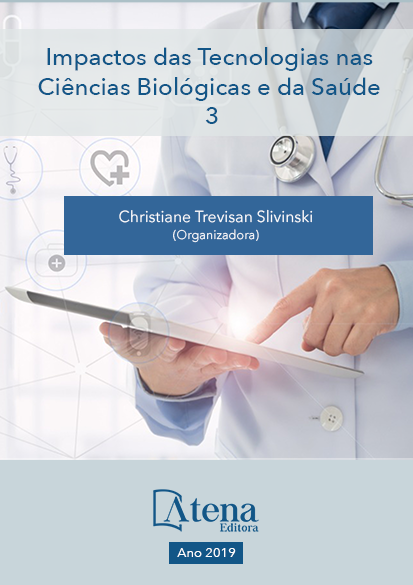
ANÁLISE DO POLIMORFISMO DE DELEÇÃO DOS GENES GSTM1 E GSTT1 E DIABETES MELLITUS EM IDOSOS: ESTUDO PILOTO
Diabetes mellitus (DM) é uma
doença que acomete grande parte da
população mundial. Podendo apresentar
como causa três fatores principais: estilo de
vida, exposição ambiental e suscetibilidade
genética. Para os fatores genéticos, podese observar que os polimorfismos são
capazes de exercer grande influência para o
desenvolvimento desta doença. A Glutationa
S-Transferase (GST), por estar envolvida
na biotransformação de xenobióticos e
produtos reativos de processos intracelulares
responsáveis pelo estresse oxidativo, podem
estar associados com DM tipo 2 (DM2). Há
evidências de que a ausência de uma ou mais
formas de GST estejam associadas à redução
da produção de insulina e do mau funcionamento
das células β pancreáticas. Assim, o objetivo do
trabalho foi a investigação do polimorfismo dos
genes GSTM1 e GSTT1 e DM. Foram avaliados
78 idosos, com idade igual ou superior a 60 anos.
O perfil genético foi analisado através reação
em cadeira da polimerase (PCR) seguida de
eletrofore. Como resultado, pudemos observar
que para o gene GSTM1 notou-se ausência
deste em 9 indivíduos diabéticos do total
portador da doença, 47,4%; no entanto, 18 dos
indivíduos com esta mesma alteração, mas sem
diabetes apresentaram 46,2%; p=0,239. Para o
gene GSTT1 observou-se ausência em 10 dos
indivíduos diabéticos, 52,6%; para os indivíduos
não diabéticos, 9 não apresentaram a deleção
deste gene, 23,1%; p=0,080. Concluimos, que
apesar do estudo não ter apresentado resultado
significante, notou-se que a deleção de tais
genes possui associação do polimorfismo com
a susceptibilidade ao DM2; sendo necessário
ampliação da amostra
ANÁLISE DO POLIMORFISMO DE DELEÇÃO DOS GENES GSTM1 E GSTT1 E DIABETES MELLITUS EM IDOSOS: ESTUDO PILOTO
-
DOI: 10.22533/at.ed.3771916013
-
Palavras-chave: Diabetes mellitus, polimorfismo, GSTM1, GSTT1
-
Keywords: Diabetes mellitus, polymorphism, GSTM1, GSTT1.
-
Abstract:
Diabetes mellitus (DM) is a condition that affects a large part of the
world population. It can present as cause three main factors: lifestyle, environmental
exposure and genetic susceptibility. For the genetic factors, it can be observed that
the polymorphisms are capable of exerting great influence for the development of this
disease. Glutathione S-Transferase (GST), being involved in the biotransformation of
xenobiotics and reactive products of intracellular processes responsible for oxidative
stress, may be associated with type 2 DM (DM2). There is evidence that the absence
of one or more forms of GST is associated with reduced insulin production and
malfunctioning of pancreatic β cells. Thus, the objective of the work was to investigate
the polymorphism of genes GSTM1 and GSTT1 and DM. A total of 78 elderly
individuals, aged 60 years or over, were evaluated. The genetic profile was analyzed
through polymerase chain reaction (PCR) followed by electrophoresis. As a result, we
could observe that for the GSTM1 gene, it was observed absence of this in 9 diabetic
individuals of the total disease carrier, 47.4%; however, 18 of the individuals with this
same alteration, but without diabetes presented 46.2%; p = 0.239. For the GSTT1
gene, absence was observed in 10 of the diabetic subjects, 52.6%; for non-diabetic
subjects, 9 did not present the deletion of this gene, 23.1%; p = 0.080. We conclude
that although the study did not present a significant result, it was noted that the deletion
of such genes has an association of the polymorphism with the susceptibility to DM2;
being necessary to increase the sample
-
Número de páginas: 15
- Layse Rafaela Moroti- Perugini


